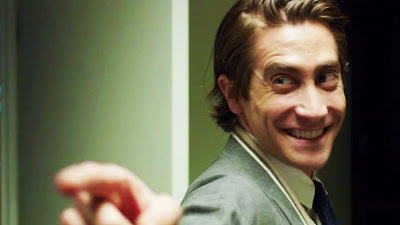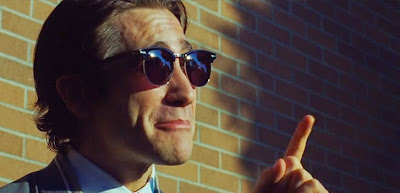Nightcrawler Review
Chills, thrills, and crazy pills
Film review by Isaac Handelman
Nightcrawler’s title sounds almost like that of a horror film, which is deceptive, as the film definitely does not fall into the aforementioned genre. Incidentally, Nightcrawler can be very scary -- thanks not to the presence of any ghosts, goblins, or masked murderers, but due to the dark, slow-building picture of psychopathy that it paints.
Jake Gyllenhaal stars as the subject of this portrait, but to say that he simply plays a character feels like a disservice to his performance. Gyllenhaal embodies Lou Pool, the petty thief whose rise to prominence is chronicled in Nightcrawler. Pool, at the start of the film relegated to shaking down security guards for wristwatches, soon finds real money to be made capturing on-site video recordings of criminal activity on the streets of Los Angeles, called “nightcrawling.” Swept up in the media frenzy, Lou soon finds himself taking dark detours on the path towards success in the shady industry.
Pool -- and by extension Gyllenhaal -- is equal parts creepy and charismatic when in the presence of other people. When he’s alone, though, he becomes horrifically unhinged. It’s no wonder that Lou acquires a stable of loyal followers through his seeming uncanny dedication to and passion for his work. But he also continually exudes an unmistakable vibe of off-ness -- a subtle, unsettling glint in his eye, swing in his step, or verbal irregularity -- that keeps viewers constantly unsure of exactly how far he’s willing to go for the sake of the shot. His mannerisms can be so fundamentally odd that they’re actually funny; in fact, Nightcrawler revels in making players chuckle at Lou right before he does something awful.
 Pool is an extraordinarily intriguing character, and Gyllenhaal’s performance is of the caliber capable of shouldering an entire film on its own. What luck, then, that the remainder of Nightcrawler also happens to be stellar.
Pool is an extraordinarily intriguing character, and Gyllenhaal’s performance is of the caliber capable of shouldering an entire film on its own. What luck, then, that the remainder of Nightcrawler also happens to be stellar.
From the beautiful opening vista shots of nighttime Los Angeles, Nightcrawler pulls viewers into its world. Director Dan Gilroy and cinematographer Robert Elswit piece together a myriad of creative shots that keep the film visually interesting in its quieter moments, but it’s during Nightcrawler’s more riveting sequences that the immersive direction truly shines, keeping viewers rooted firmly in the shoes of those directly involved with the overwhelming intensity on-hand.
The mellow, occasionally upbeat score sharply contrasts the film’s dark tone. This stylistic decision is initially jarring, though ultimately clarifies the film’s depiction of psychopathy; we as an audience can sometimes feel as ambivalent towards the heinous actions transpiring on-screen as Lou is, before suddenly being wrenched back to reality by the realization that what we’re seeing is beyond amoral. It’s a deeply unsettling, brilliantly effective experience.
The journey that Lou takes would, under normal circumstances, be considered a descent into darkness. Nightcrawler instead makes it feel like we’re witnessing a rise to power. More than anything else, Nightcrawler is a foreboding account of the ease with which a psychopath is able to best all who oppose him thanks to his sheer strength of will and dedication to his own cause, regardless of what that means for anyone else.
The film is also an intelligent critique of media sensationalism and society’s glorification of violence. The voices of reason in the film, like innocent sidekick Rick (Riz Ahmed) and idealistic news consultant Frank (Kevin Rahm) are drowned out and left by the wayside to wallow in their antiquated moral righteousness. Nightcrawler’s creeping cynicism might convince you that the only way to get anywhere on the ladder of life is to knock everyone else off.
But more likely, viewers will exit Nightcrawler more willing to be tossed to the ground by Lou Pool than to become anything that resembles him. You can thank Gyllenhaal for that, and you can also thank the actor for elevating an already great film to masterful heights.






Comments
Post a Comment